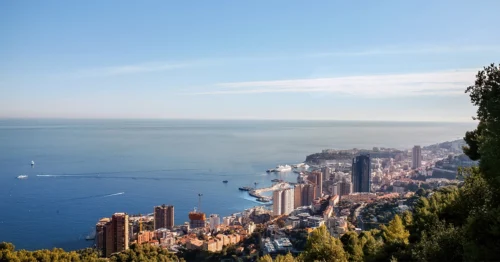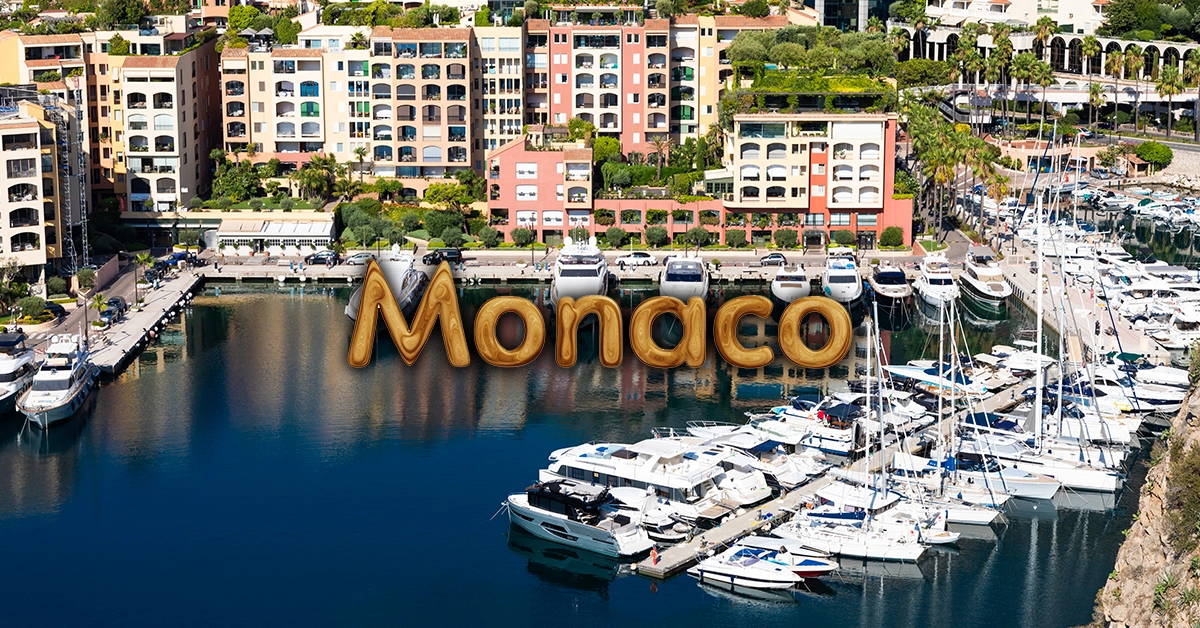Beyond the Glitz: Exploring Monaco’s Hidden Facets

Predicting Apple Stock Prices (AAPL) for the Next Three Decades (2024, 2025, 2030, 2040, 2050)
May 29, 2024
Discover How Beginners Can Easily Earn $1000 Online: 10 Proven Methods
June 28, 2024When people think of Monaco, images of luxury, wealth, and glamor often come to mind. This tiny city-state on the French Riviera has long been associated with opulence and extravagance. However, there is much more to Monaco than meets the eye. In this article, we will delve beyond the glitz and glamor to uncover the lesser-known aspects of this fascinating principality. So, pack your bags and join us on a virtual Monaco trip as we explore the hidden side of this captivating destination.
Is Monaco Nestled in France or Italy?
Monaco, a gem of the Mediterranean, occupies a unique geographical position that often leads to confusion regarding its exact location. Officially, this sovereign city-state graces the coast of the French Riviera, enveloped on three sides by France's picturesque landscape, with the sparkling Mediterranean Sea bordering its southern edge. This strategic position has allowed Monaco to carve out its distinct identity, separate from its French and Italian neighbors. Although Italy's influence is palpable due to its proximity and historical interactions, Monaco is not part of Italy but a separate entity with its government, culture, and traditions. Its independent status has been maintained through a series of treaties and diplomatic negotiations, particularly with France, which has provided a protective and supportive role over the years. The principality's location has contributed significantly to its allure, offering residents and visitors alike stunning coastal views, a mild Mediterranean climate, and easy access to both the French and Italian Rivieras, enhancing Monaco's appeal as a luxurious destination.
The Predominant Religion of Monaco
In Monaco, the spiritual landscape is predominantly shaped by Roman Catholicism, which plays a pivotal role in the cultural and social life of the principality. This adherence to Catholic traditions is deeply ingrained in Monaco's heritage, influencing everything from public holidays to ceremonial events. The Monaco Cathedral, an architectural marvel and place of worship serves as a central point for the Catholic community, hosting numerous religious ceremonies that draw both locals and visitors. Religious festivals and processions are not uncommon, reflecting the principality's dedication to its patron saints and the Catholic faith.
The government of Monaco also maintains a unique relationship with the Roman Catholic Church, emphasizing its importance in the principality’s identity. Despite this strong Catholic presence, Monaco is a cosmopolitan society that respects religious diversity. Other faiths and denominations are welcomed and practiced within the community, highlighting the principality's open and inclusive approach to religion. This coexistence of religious beliefs contributes to Monaco's rich cultural tapestry, fostering an environment of mutual respect among its inhabitants. The Roman Catholic faith, however, remains a significant aspect of Monaco's cultural fabric, shaping its traditions and celebrations throughout the year.
The Pillars of Monaco's Fame
Monaco's renown extends far beyond its geographical confines, captivating the imagination of people worldwide. Central to its fame is the iconic Monte Carlo Casino, an emblem of sophistication and high stakes that has been immortalized in films and literature. This illustrious establishment is not just a gambling venue but a cultural landmark, drawing visitors eager to soak in its opulent ambiance. Equally magnetic is the Monaco Grand Prix, a pinnacle event in the Formula 1 calendar. This prestigious race transforms the city's streets into a high-octane circuit, attracting a global audience and cementing Monaco's status in the racing world. Beyond these, the principality's allure is amplified by its breathtaking Mediterranean coastline. The azure waters and pristine beaches offer a tranquil escape from the fast-paced excitement of Monaco's urban center. Adding to its charm are the luxurious boutiques and high-end establishments dotting its landscape, catering to a clientele with discerning tastes. Nightlife in Monaco is vibrant, with exclusive clubs and bars providing spaces for socializing and entertainment against the backdrop of the Riviera's scenic beauty. Together, these elements weave a tapestry of allure that makes Monaco a beacon of fame on the global stage.

Monaco Sea view
The Cost of Living in Luxury
Residing in Monaco epitomizes the epitome of luxury, reflecting its status as a haven for the affluent. The principality's real estate market is notoriously expensive, with properties commanding some of the highest prices globally. This premium on housing is due to Monaco's limited land and its appeal as a prestigious address, making it a coveted location for the world's elite. In addition to high housing costs, daily life in Monaco comes with its own set of luxuries and corresponding price tags. Dining in exclusive restaurants, shopping in high-end boutiques, and attending glamorous events all contribute to the elevated cost of living.
Monaco's economy supports this lavish lifestyle, offering a tax-friendly environment that attracts businesses and individuals alike, seeking to maximize their earnings. This financial advantage, however, also contributes to the high living expenses, as the demand for luxury services and goods continues to grow. Even routine activities and necessities in Monaco are infused with a touch of luxury, from gourmet groceries to designer fashion, impacting the overall cost of living. Despite these expenses, the allure of Monaco's opulent lifestyle, combined with its picturesque setting and high security, continues to draw residents willing to invest in this unparalleled living experience. This commitment to a life of luxury underscores Monaco's unique position as a playground for those who seek the finest things in life, amidst its breathtaking Mediterranean backdrop.
Unveiling Monaco's Wealth
The opulent lifestyle and image of Monaco are sustained by several key factors that underscore its wealth. At the heart of its economy lies a favorable tax regime that has historically drawn high-net-worth individuals and businesses from around the globe. Monaco does not levy personal income tax, which acts as a significant magnet for wealth accumulation within its borders. This tax advantage is complemented by a robust banking sector known for its privacy and security, making it a preferred choice for international wealth management.
Moreover, Monaco's strategic location along the French Riviera contributes to its thriving tourism sector, further bolstering its economy. Luxury hotels, yachts, and the allure of the Monte Carlo Casino add to the principality's revenue streams, attracting visitors yearning for a taste of the high life. The real estate sector in Monaco also plays a pivotal role in its economic success. With the demand for property far exceeding the supply due to limited land availability, real estate prices in Monaco are among the highest worldwide, contributing significantly to its overall wealth.
These elements, combined with a diverse and flourishing service industry that caters to the luxury market, ensure that Monaco's economy remains vibrant. Investment in cultural events, sports, and an infrastructure that supports a high-quality lifestyle further enhances its appeal to those seeking the epitome of luxury living. Through these avenues, Monaco has cultivated a rich economic landscape that underpins its status as one of the world's wealthiest enclaves.
Language Diversity in Monaco
In the cosmopolitan tapestry of Monaco, linguistic variety flourishes alongside its cultural richness. French, as the official language, permeates government, education, and public life, weaving a common thread that unites the diverse population. However, the principality's global allure and international demographic mean that English holds a significant place in everyday communication, especially within the realms of business, hospitality, and tourism. It serves as a bridge, facilitating interactions among Monaco's multinational residents and visitors alike.
Monaco's language diversity doesn't end with French and English. Italian, reflecting the close historical and geographical ties to Monaco's neighbor, is also widely understood and spoken, contributing to the principality's unique Mediterranean identity. Additionally, Monegasque, a language native to Monaco, underscores the principality's deep-rooted traditions and heritage, though it is less commonly used in daily conversation. This multilingual environment highlights Monaco's position as an international crossroads, where cultures converge, and languages intermingle seamlessly. Within this linguistic mosaic, residents and visitors navigate through a world where communication is enriched by a blend of languages, each adding its distinct hue to the vibrant palette of life in Monaco.
Birthright and Becoming a Monacan
In the intricate fabric of Monaco's society, citizenship is a coveted status that extends beyond the mere circumstance of being born within its borders. Unlike many countries where birthright confers automatic citizenship, Monaco adopts a more selective approach. The process to become a Monegasque citizen is underpinned by stringent requirements that highlight the principality's dedication to maintaining its unique cultural and social identity. For those not fortunate enough to inherit citizenship through their family lineage, the path to becoming a part of Monaco's exclusive community involves navigating through a detailed application process. This includes demonstrating a sustained period of residency, showcasing financial independence without being a burden on the state's resources, and proving one's integrity through a clean legal record. The principality's government evaluates each application with diligence, ensuring that new citizens align with Monaco's values and contribute positively to its society. This meticulous approach to citizenship underlines Monaco's status as an exceptional place, where becoming a part of the community is both a privilege and a responsibility. In this light, Monaco's citizenship policy reflects its broader ethos of exclusivity and excellence, underscoring the principality's unique position on the world stage.
The Journey to Monacan Citizenship
Achieving citizenship in Monaco is a rigorous and demanding process, reflecting the principality's exclusivity and the high value placed on this prestigious status. Candidates are required to demonstrate a long-term commitment to the community through extended residency, often spanning several years. Financial stability is another critical criterion, with applicants expected to prove they can support themselves without recourse to public funds, showcasing their ability to contribute to Monaco's affluent society. A clean criminal record is essential, emphasizing the principality's emphasis on security and the high moral standards expected of its residents.
The procedure involves meticulous scrutiny by Monaco's authorities, who assess the applicant's integration into Monegasque society, their command of the French language, and their understanding and respect for the culture and traditions of Monaco. This comprehensive evaluation ensures that those granted citizenship are not only financially capable but also aligned with the principality's values and way of life.
Prospective citizens often engage with local communities and participate in cultural and social events as part of their journey, Prospective citizens often engage with local communities and participate in cultural and social events as part of their journey toward citizenship. This active involvement demonstrates their commitment to integrating into Monegasque society and understanding the local way of life. By immersing themselves in the culture and traditions of Monaco, these individuals gain a deeper appreciation for the principality and its unique values.



